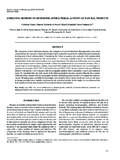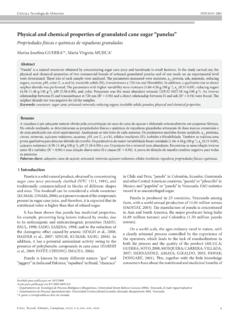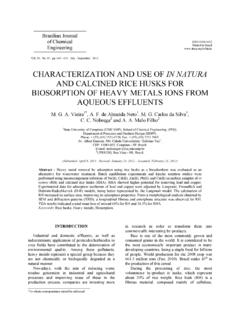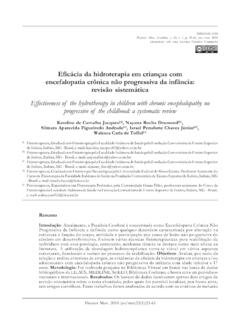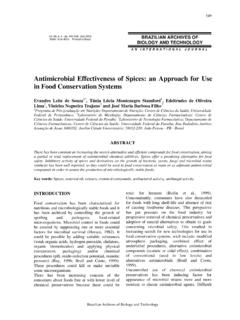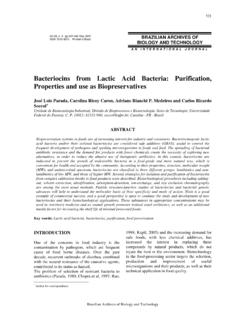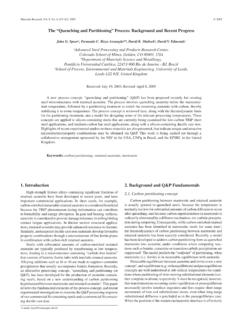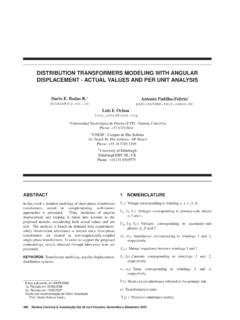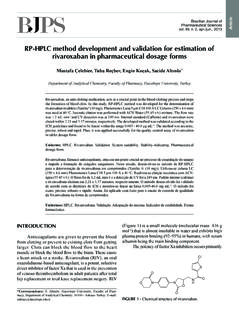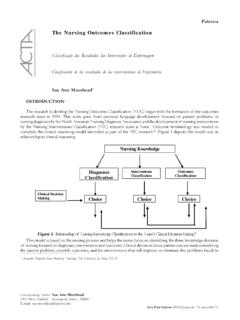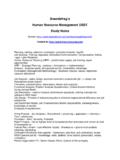Transcription of herbert a. simon and the concept of rationality ...
1 Revista de Economia Pol tica 30 (3), 2010455herbert a. simon and the concept of rationality : boundaries and procedures gustaVo Barros*This paper discusses herbert A. simon s conception of rationality in two of its principal general definitions: bounded rationality and procedural rationality . It ar gues that the latter is the one that better synthesizes the author s view about rational behavior and that the former fills mainly a critical function. They are complemen tarily used by simon in this sense. In spite of that, it is argued that it is the low degree of specificity of the concept of bounded rationality one of the reasons for its relatively greater : herbert A. simon ; bounded rationality ; procedural Classification: D01; B31; B52. INTRODUCTIONH erbert A. simon was the self proclaimed, and proclaimed, prophet of bounded rationality ( simon , 1996, p.)
2 250; and Sent, 1997, p. 323). In spite of the tone of such statement, it is beyond doubt that, in economics at least, the concept of bounded rationality is firmly associated with simon s name, and conversely, and Brazilian Journal of Political Economy, vol 30, n 3 (119), pp 455 472, July September/2010* Gustavo Barros is Economics student at FEA USP. E mail: This paper is a sequel to the author s MA dissertation about herbert A. simon s economic work (Barros, 2004) done under supervision of Prof. Ana Maria Afonso Ferreira Bianchi and presented to FEA USP (Faculdade de Economia, Administra o e Ci ncias Cont beis da Universidade de S o Paulo). That research counted on financial support of CAPES and FIPE. This paper also benefited much from interaction with the research group Complex (Economia e Complexidade) at FEA, in particular the argument here pro posed owes much to discussions with Prof.
3 Jorge Eduardo de Castro Soromenho, and comments made by Prof. Gilberto Tadeu Lima on both the original work and a preliminary version of this paper al lowed for important improvements. I would also like to thank the comments on the original work made by Edmundo Juarez Filho and comments by participants of the II Research Workshop on Institu tions and Organizations (FEA USP, 2007) on a preliminary version of the paper. Submitted: August 2007; Approved: March de Economia Pol tica 30 (3), 2010456that his authority is, time and again, employed to buttress the use of the concept that is being done, nowadays in a relatively more frequent fashion, by diverse strands in the field of economic simon was part of the chorus of critics to the concept of global ra tionality from the early beginnings of his career, a more precise conceptualization, and even the term bounded rationality date from the mid fifties.
4 According to Klaes and Sent (2005), in all likelihood, the term first appears in print in the 1957 book Models of man, social and rational. As far as I know of, this is indeed the precise date of birth of bounded rationality . According to simon himself, the position was already clearly outlined in a paper not much antecedent, and which was in cluded in the 1957 book ( simon , 1955; about this, see Silveira, 1994, p. 73). As a matter of fact, by this time, the concept had already the form and basic content it has up to today: the incapacity of exercise of global rationality makes the eco nomic agents beings endowed with a bounded rationality . However, simon , along his long lasting and prolific career, would advance much towards specifying his conception of rationality . One of the most important steps in this direction was the concept of procedural rationality ( simon , 1976b), proposed little before he was awarded the Nobel Prize, in 1978.
5 To my judgement, procedural rationality has the ability to synthesize very adequately simon s view of rationality . Nevertheless, this second general concept of rationality has nowadays a much less marked pres ence in the economic science field and, as far as I know of, never had such a wide penetration as the concept of bounded this paper, I argue the following. First, that the concept of bounded rational ity is characterized, above all, by its low degree of specificity. Second, that this characteristic can explain much of the (relative) current popularity of the concept . In the third place, I argue that simon s remaining main contributions to the debate on rationality and economic behavior, including the ones preceding 1976, can be grouped under the term procedures and, therefore, his behavioral theory is based on procedural rationality .
6 In other words, it is the case of treating the concept of procedural rationality as the one that best expresses simon s view of rational be havior, to the detriment of bounded rationality , which mostly plays a critical role to mainstream economics. This paper is composed, besides this introduction, of four more sections. The second section discusses the concept of bounded rational ity aiming at defining it and at pointing some of its important characteristics. The third section presents the concept of procedural rationality so that, in founth sec tion, we can discuss the relation between these two general concepts of rationality advanced by simon . Special attention is dedicated to the historical chronology of the construction of these concepts by the author, bearing in mind that this chrono logical ordering helps in making clearer the logical relation between them.
7 Finally, in the fifth section some final considerations are made. 1 Klaes e Sent (2005, p. 42) point out that procedural rationality performed a secondary role in his [ simon s] corpus as well as in references to his work .Revista de Economia Pol tica 30 (3), 2010457 BOUNDED RATIONALITYS imon, throughout his work, consistently strived to build a theory of human behavior. This is true, in particular, with respect to his incursions in the eco nomic field: what he produced was, above all, a theory of economic behavior. In other words, his focus was less the economy than the economic agent , though this agent does not necessarily equate to individual . rationality is centrally placed in this behavioral theory: it is the main explaining element, although not the only one. To simon , the distance between rationality and behavior is bridged by the concept of decision.
8 2 A choice is a selection of one, among numerous possible behavior alternatives, to be carried out. Every behavior involves a selection of this kind, be it conscious or not. A decision is a process trough which this selection is performed. rationality is a criterion used in the decision that is theoretically grounded on the presupposition that the agents are intendedly rational. In other words, the agents value rationality as a criterion of choice and it is in this sense, and by this route, that rationality is taken as an explaining is defined by simon as a relation of conformance (efficacy) between preestablished ends and the means to reach them. To him, the specification of these ends is a question of value and, hence, is beyond the scope of science. However, the relation between means and ends is a question of fact. The factual evaluation of this conformity involves, in theory, three steps : (i) the listing of all possible be havioral alternatives; (ii) the determination of all the consequences that will follow, in the future, to the adoption of each of these alternatives (in a determinist way or in the form of distributions of probabilities); (iii) the comparison of the alternatives, that should be evaluated by the sets of consequences following each one of them, according to the preestablished ends (utility, profit or any other specified pay off function).
9 Up to this point, simon does not distance from the canonic concepts of ratio nality, which appear under several names in his work: global rationality , sub stantive rationality , the rationality of neoclassical theory , objective rational ity , maximization , optimization , perfect rationality , strict rationality and perhaps still others. In order to obtain some terminological homogeneity even if at the risk of some imprecision I ll adopt the term global rationality to refer to all of , in Administrative Behavior (1947), though emphasizing the distinction between effective and theoretical behavior, assumes the model of global rationality . This point is worth stressing, for it is not usually appreciated in its proper dimen 2 Rigorously, problem solving should also be included here. However, in simon s definitions the frontier between decision making and problem solving is quite blurred: in general, the more im portant are search processes, the closer we will be of problem solving and the farther of decision mak ing.
10 I will treat both indistinctively by the term decision , for I understand this distinction, although important in other contexts, does not affect the main lines of argument here de Economia Pol tica 30 (3), 2010458sion, and leads to some very widespread misunderstandings concerning the history of the concept of bounded rationality . It is true that, already in 1947, the distance starts to appear in statements regarding the incapacity of the agents of carrying out, in practice, the steps listed above: (i) global rationality requires knowledge of all possible behavior alternatives, however just a few of these alternatives are consid ered; (ii) global rationality requires full knowledge and anticipation about all future consequences that will follow each alternative, however such knowledge is always very fragmentary; (iii) the valuation of the consequences has, too, to be predicted , and such prediction will depend, among other things, on imagination (1947, pp.)
